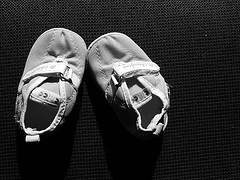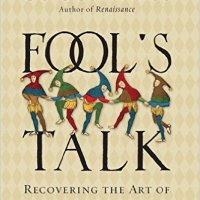 Supposedly, Ernest Hemingway once wrote a six-word story that he considered his best:
Supposedly, Ernest Hemingway once wrote a six-word story that he considered his best:
For sale, baby shoes. Never worn.
Now, I must confess that when I first read this, I thought “what’s the big deal?” But later that day the story came back to me and I started to meditate on it. And after only about 30 minutes of reflection, I can see why it is so compelling. This story is a doorway into a labrynth that is nearly impossible to escape.
I am a father of three, the youngest 1, the oldest 5. So I am relatively new to the baby thing, but certainly initiated into the club. First I notice that the story is not really about the baby, but about the seller of the shoes. I guess we are meant to assume certain things as necessary background to the story, but here is where it gets interesting.
Are we to assume the parent is selling the baby shoes? Or someone else connected to the baby? Or someone disconnected that merely owns this pair of unused shoes? Assuming the parent, it is the mother or the father?
Let’s say the shoes belong to mother. Why is she selling baby shoes never worn? Did something happen to her baby? Did the baby die in the womb? Did baby die during labor? Did baby never reach the age to wear the shoes? The baby has an untold story, and it could be anything. Was baby blessed with a surplus of shoes and therefore didn’t need this pair? It could be as simple as baby just never wore the shoes because mommy didn’t for whatever reason put them on. But the form of the story invites a different answer.
Why is the mother selling these unworn shoes? Is she done having children? How can she be sure? Was the baby her last of several children she is raising? Or was baby the first and there will be no more? Why does she have to sell the shoes? Doesn’t she care to keep such an intimate item connected to her baby? Does she not know someone who needs a pair of baby shoes, someone close to her who she wants to help? And baby shoes are cheap! She couldn’t need the money, could she? The terse form of the story and it’s key words suggest it is an advertisement. She placed the ad in the paper, which would have cost money. The windfall from the sale of the shoes couldn’t be worth the trouble. But maybe it’s the principle of the thing. Perhaps she is determined to sell her baby’s never-used shoes? Perhaps is will provide the kind of closure that giving the shoes to a friend cannot provide. After all, she might be thanked for the shoes and might even see them on another’s baby! But again, why is she selling them? Couldn’t she just throw them away? Why go through the trouble of advertising them? She must want the attention, or the pity, or to be questioned so as to explain her story. Maybe the father is gone and she has no one to talk to. Or might she just be hardened to a tragedy now after a short bit of time? Maybe a long time has past and she is at peace with her baby’s demise, and wants to buy something with the money she might receive from their sale. Perhaps, but each possibility just raises more questions.
Hemingway’s choice of words in this brief story is illuminating. It could have been baby’s shirt or dress for sale. Why did he choose “shoes”? Shoes are meant for walking. They connote hope and dreams and expectations for growth and activity in a baby’s life. These shoes were never worn. Mother’s hopes were dashed and completely unfulfilled. What tragedy! The shoes were not even worn once. Mother and father never had the opportunity to dress up their little one and take pictures, or to parade baby around the home in play-walking like a grown-up. There was never a taste of what these shoes promised. They are probably still in the box with original tags attached. Hemmingway chose the shoes of a “baby”, not a toddler, or child, or someone else. This tugs at the heart strings of every person who shares in the experience of the broken human condition. This story has universal appeal. It doesn’t just resonate with mothers and fathers, or with religious people, or with Americans. Everyone was once a baby and can relate to the pain in the background of this story. We could go on and on.
All good literature has the capacity to touch anyone’s heart with a little reflection. This six-word story is no different.














Interesting blog. I am a Hemingway fan, but had yet to come across his six-word story. I am in the process of studying for my final exam in graduate school and have some Hemingway to freshen up on. I should reach his works by the end of the year.
I read the story and immediately began thinking of why the baby hadn’t worn the shoes. I went in the direction of finding out the story about the baby, rather than wondering about the seller of the shoes.
Why Hemingway chose shoes instead of another article of clothing is a good question. I know that parents keep their child’s shoes to remember how tiny they were. There’s something in us that wants us to remember that period of time, and there’s something about shoes that does it for us. Maybe it has to do with the needy/dependent/helpless relationship of that moment in time when Ia child wears shoes, but really doesn’t need them because it can’t use it’s legs to walk yet. So the shoes are symbolic of the inevitable future. And in this case possibly there was no future. I’m just guessing here…
Good blog.
Thanks for the comment, Mark. Your analysis is interesting too. There are so many directions you could take this. That’s what makes it intriguing to me. I haven’t read much Hemingway. Where do you recommend I begin?
Holy blast from the past, Batman.
What’s up Brian? jimi adams here. Haven’t talked to you in a LONG while. Stumbled here from Shawnea & Chris’s page…gotta love facebook updates. What’s going on with you? i’m in S. Africa at the moment..a little detour on my way from Columbus (where i jsut graduated from OSU) to NYC (where i will be at Columbia for the next two years). i didn’t see an email link on here, so you should drop me a line via the one i am posting with…would be cool to catch up a little. cheers.
Very sad story! Reminds me of Hill Like White Elephants :-(
I apologize if I did not read all of the comments attentively, however this “short story” has nothing to do with the seller.
There is no seller. The baby died. That’s why they’re not used.
At least that is the context most commonly associated with this phrase, this phrase which may or may not have been written by Hemingway.
Max,
I appreciate your comment. Just one question: how do you *know* the baby died? I explored that possibility in this post, but it is not the only interpretation. The “short story” does not explicitly say the baby died. Also, I don’t know how you can assert that “there is no seller.” That’s ignoring a third of the story’s details. My take on the story is that it is brief and vague enough to possibly mean many things. That’s the beauty and mystery of it.
Peace,
Brian
A great story. My initial interpretation was that the mother had had a miscarriage before her first baby was due (I assumed the shoes were a gift). This led her trauma and now she just wants to be rid of them. She does not give them away to anyone she knows so that she can remove herself as much as possible from the sentiment of the shoes. The shoes may also have been given by someone close, or she may have bought them herself, but I stick with that it was a gift. She places an ad in the newspaper instead of throwing them away as she wants someone else to be happy with the shoes, as they may have had sentimental value too (perhaps vintage).
Anyway, I agree that literature is very open to interpretation, and with regards to a story of six words, even more so. It makes for vast and varying analyses, and also allows new story ideas to spring up.
Great ideas are short and to the point, however ambiguous that point may be.
I don’t *know* but my post is based on this logic:
given: For Sale, Baby Shoes:
FACT: Baby feet grow so fast you need to switch em every week or month or whatever it is.
Now, why would someone be selling Never-worn baby shoes?
There can only be 4 logical possibilities:
1. Person bought new shoes, re-selling them.
now that would not be an interesting story, and why specifically baby shoes, and it just doesn’t tie together retrospectively very well. ELIMINATED
2. Person received many baby shoes, due to the baby aging, there were pairs of unworn shoes. – again, we would expect a bit more plot to a Hemmingway line…. AND again it wouldnt win the contest because its not interesting. ELIMINATED
3. A Lady who couldn’t have a baby was crazy enough to buy shoes for a non-existing baby that later her therapist told her to sell as part of her rehabilitation process into sanity. – Sure… but come on. ELIMINATED
4. For Sale, Baby Shoes… .sets up an image of a Mother, which in turn brings feelings of love, caring, all that… a feeling of confort sets in….. Never Worn: Now why would they have never worn? its either 1,2,3, or … it was a Stillbirth/miscarriage/ died shortly after mom bought a gift.
Now, considering the bluntness of the statement, one could also assume it is short because it would be traumatic for mom to post more details… the other stuff could have been mentioned.
If you saw an AD on CraigsList that simply said:
__________
For Sale, baby shoes. Never worn.
Call: XXXXX
————
wouldn’t you make a scientific guess as to why this post is in this format?
Sure there are other “interpretations’ or as I like to call them – “guesses”
But just like in Math, there is only one real answer in English – and the only person that knows what posessed him to write those words is the Author himself. Other than that, all we have is common sense and I think I’ve proved to you using that process that this statement sad context combined with the contrast of imagery between “Baby shoes” and “Never worn [for some reason]” would stir emotions of loss.
You could never be sure,
but chances are if you’re sure enough, you’re right.
4
I absolutely love this story. But it took a while to get to that point. When I first read it I simply didn’t get it. Buit now, I can’t stop thinking about it.
Yeah, it’s like an onion. Lots of layers of potential meaning and story.
Max,
Thanks for your response. I like your logical thought process. I actually agree that the story most likely means the baby died. I listed some of the other possibilities as a record of my stream of consciousness meditating on it. Determining that the baby died is really the easy part. However, I think the intrigue and true value of the story (and by extention all literature) is how it invites us to step into the mother’s shoes (figuratively speaking of course!) and ponder the possible depths of her agony.
Your obviously a logical guy, so I’d like to know what you think. What are your thoughts concerning the mother’s story (not just the fact that her baby died)? I assume you believe that’s worth considering–even though it is speculative and not a part of the story proper.
Peace,
Brian
My analysis of: For sale:baby shoes, never worn.
Three possibilities:
I-Baby died before reaching the age of walking. (or both baby and parent(s) died and someone else un/related to them is selling the shoes.) Whether the shoes were a gift or not doesn’t change the outcome so it doesn’t matter/count as an argument.
II- The immediate future has more priority then the distant.(baby didn’t die, but the parent (or anyone who has to raise it) wants to sell the shoes to feed it (as you noted baby shoes cost little so food is the only need that urgent and with approximate cost) But then the only reason why a parent wouldn’t have calculated the cost of the shoes before buying it would be that of an emergency.[or shoes were a gift, but someone would naturally have given the family money to help raise the child, instead of a present (such low economical level can’t be hidden)]
III- Baby can’t walk (born with deformation, or some incident happened) just because that’s a possibility, but that means no story beyond that, which would haphazard the story.
I exclude:
1-there is no seller
2-baby being last of multiple kids
3-baby having tons of shoes
4-someone bought baby shoes without needing them
5-someone found a pair of baby shoes
6-a crazy person bought them
1=someone has to *sell* them, which means someone needs money and by the sum, quickly.
2=there’d be shoes left from previous babies. If you were is such a state as to need petty cash you wouldn’t have bought them in the first place.And no shoes of older babies wouldn’t be worn out for a baby doesn’t use them enough.(s/he grows fast and doesn’t run or jump during that age)
3= Read 2 (2nd sentence)
4= petty story,no signification.It’s an insult to any writer. wouldn’t lower him/herself as to sell them, let alone with a placard.
5= If someone *founded* a pair of baby shoes s/he wouldn’t know if they were used or not.
6=crazy people can’t think as brightly(let alone wright) as to include the never used factor (the adding of which would bring them more money is the shoes got sold) which excludes the possibility.
More in depth:
-The economical reason plays a major role. This tells us of the critical state of the *country this story is taking place.
*for a parent to suddenly be short on cash something happened.
*in a country with a normal state, the parent could get help from various places.(so someone in such a desperate need of petty cash wouldn’t go all that way.)
*in a country with a normal state, such an ad would stick out and you wouldn’t expect people to actually buy it.(It would be hard to sell them, but instead you’d rise suspicion on yourself)
*remember E.H. is of “the lost generation”
*my deduction tells me a person not closely related(more below) is selling those shoes, for such a person to get in possession of a single pair of unworn baby shoes something close in scale to war (or natural disaster, or infamy) must have happened.
-There are strong connotations towards the death of the baby and perhaps the parent too.
Because a parent who’s baby died wouldn’t sell it’s baby’s shoes (unless s/he had other kids, but which is excluded on the above list) and I doubt s/he be so selfish as to sell those shoes to make it past a day.
The ad is cold and all business.(leads to unrelation with the family)
But again not someone completely unrelated or s/he wouldn’t know whether the shoes were used or not. never worn are two of the six words so they wouldn’t be false for that would lead to a false story.
As far as the: Why shoes? question goes. It’s a very specific question, which tells me you Brian have already figured the gist of it.
Yes shoes are a symbol. But unlike you, I assume hope and expectations are only part of the feeling the shoes harbor. It is when shoes are taken as a representation of progress (shoes represent walking, walking represents making progression) that the story unfolds. And progress is what the story of this baby lacks. For the baby has *an untold story*.
It’s story ended before starting.
I see this story as representing the horrors of child labor. The abuser is selling the child’s shoes, thus never allowing the child to walk in his own shoes (and experience the life of a child, rather than that of a working adult). To make matters worse, the shoes are for sale. In other words, the abuser will be making a profit as a result of the child’s inability to experience childhood.
I’m more incline to think it was about a successful person who never took baby steps, instead they took big chances and challenges, and succeeded.
Baby is born without legs, probably!
And the winner is………….Neetu George! Ha!
For sale, baby shoes. Never worn. Obviously the person selling the shoes is the owner of the shoes. The shoes were the only thing the seller had from his/her parents but they never worn the shoes as a baby and recently found them in the attic. The owner, was an orphan who spent most of his/her life looking for his/her parents and thats why they took the time and money to put the ad in the newspaper, to see if that way the parent can recognize the shoes therefor call the seller, their orphan child, and be reunited.
So, five years after original post we finally have the answer: gen-y 30-something hand-crafts expensive baby shoes and sells them on etsy.
I really feel like this is a late reply since this story was written 2 years ago, but I just want to get my thoughts out there. Today was the first time I read this story and like you at first I didn’t really get what the big deal was. I thought it was kinda funny that people made such a big deal over this short story. Then I thought about it and all at once it hit me and I felt like I was going to cry. My first instinct was to think about the baby, and how the baby died. I didn’t even think about the seller for several minutes. But when I did I was kind of outraged. Why would they want to get rid of this baby’s shoes? Did they want to get rid of the bad memories that the shoes caused due to the premature death of their child? But then why would they sell them? To make money off of their child’s death? Why not throw the shoes away? Or perhaps they wanted to sell the shoes to another family so that family’s child could wear the shoes and live the life that their own never got the chance to.
If I were ever to see an ad like this I probably wouldn’t even think twice about it. Not many people would I think. But I think it was brilliant of Hemingway to create such a thought provoking story using only 6 words. Not only that but it makes me feel like this COULD be an actual ad out there right now. That there are families sitting out there wondering what to do with their never worn baby shoes…
Sorry if there are any grammar errors or if this isn’t very well written, I’m only 16.
Thanks for your thoughtful response Kaitlyn. Replies are never too late.
Hmm… great that you brought this up, this story always gets me thinking. I agree, it implies the baby has died, but I always felt it implied the death of the mother too. NO mother would **sell** baby shoes after her baby had died, but if the baby had also killed the mother, the father or family (if the father was absent) might be ambivalent. Especially during the Great Depression or in places of extreme poverty, mother and baby could have been killed by some epidemic exacerbated by their poor living standards and the money to fight it with medicine, doctors visits etc would need to be covered. The sale of any ‘fancy’ or ‘unused’ item would be necessary, especially if the husband or other family members were/ had been ill too and unable to work, perhaps nursing the mother. This is a comment on what poverty does to people: they aren’t allowed to be sentimental.
Insightful analysis about poverty and sentimentality. Thanks for the comment!
Maybe the point is that you can arrive at 23 passionately argued comments and 1 blog post after reading only 6 carefully selected words.
Great post, by the way!
Ha! Thanks the for the comment, Molly. Peace, Brian